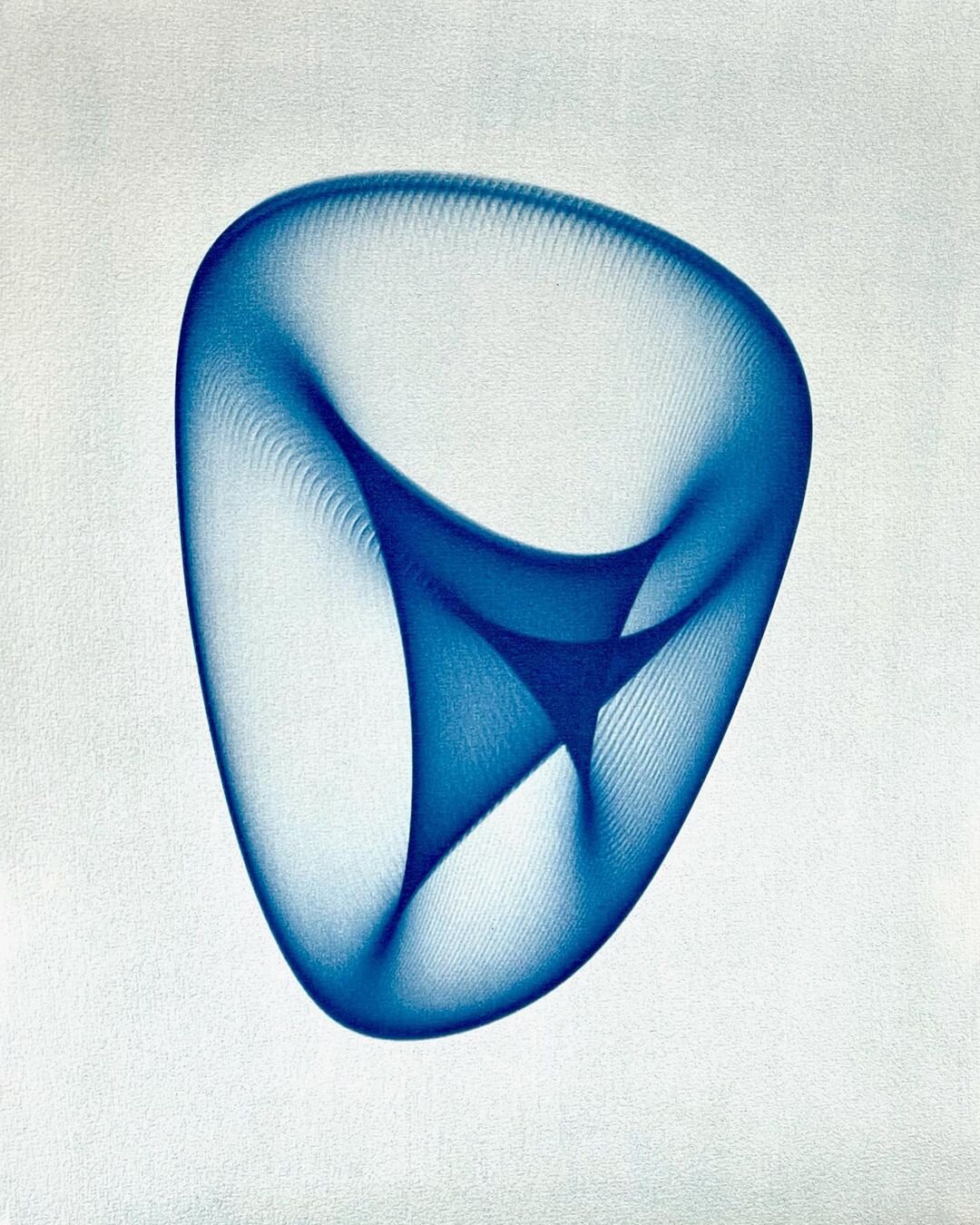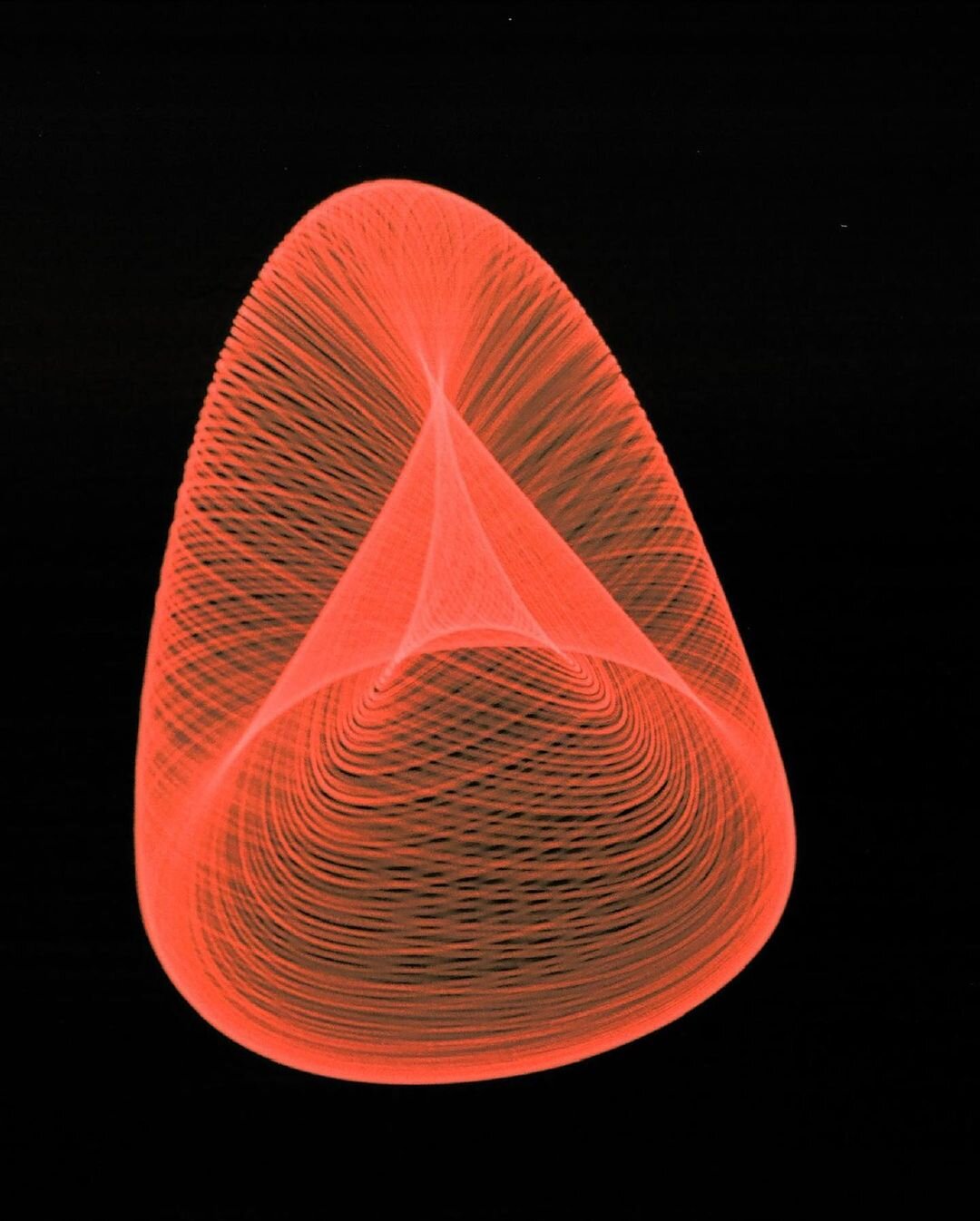Ralf Jacobs
Perhaps it is best to describe Ralf Jacobs as a photographer. He ‘writes with light’ in a wonderful spectrum of old and new techniques, from 19th-century cyanotypes to software-guided laser projections. Combining different photographic procedures and images, he creates new realities that incorporate time as a tangible presence. Instagram: @raaaaaaaaaalf
Harmonography
An old-fashioned harmonograph is a machine with rods and weights that mechanically moves a pencil across a piece of paper. Driven by the swinging motions of two or three pendula, it produces an endless variety of intricate elliptic line drawings. Jacobs uses software that emulates these motions instead, to create digital versions. It allows him to tinker with variables like frequency and phase, until a pattern emerges that shows the beauty of scientific imagination, liberating it from its mathematical equations.
Cyanotypes
A laser can trace the harmonographic image on chemically treated paper to create a cyanotype, a photographic printing process also known as blueprint, discovered in 1842 by Sir John Herschel. Jacobs uses this vintage process also to transfer conventional photographs to the characteristic cyan hue, saturating the image with a melancholy passage of time.
The invisible world
In a next step, superimposing harmonographic images onto regular pictures in cyanotype, Jacobs presents the patterns as alienating elements. Or are they intimate reminders of all that goes on beyond our everyday perception of reality? Another set of mathematical equations that Jacobs explores for their intriguing visual representation belongs to chaos theory. Lorenz attractors, for instance, appear in several of his works, introducing an unpredictable dynamic that seems to suit our era.
Light flukes
The process Jacobs calls light flukes is closest to his profession as an optical engineer. Based on the technique of refractography, it involves a bundle of red, green and blue light that travels through a refractory object, like a glass object or a lens shape, before it is registered by the camera. The resulting colourful chance patterns and images deny their tiny scale to suggest playful forces of a cosmic dimension.
Wonder
The light phenomena captured by Ralf Jacobs in their appealing complexity and poetic beauty suggest an enviable innocent sense of wonder about the world. Jacobs has retained the ability to be mesmerised by rays of light and their intricate behaviour, even when his profound expertise in optics, lenses and perception might go a long way to elucidate the physical principles behind them. These principles can’t, of course, explain why the images constantly generate new questions and ideas, nor why Jacobs’ photographs can elicit such emotion and meaning.
Where would you like your work to take you?
The main reason I started making art, is because of the fulfillment I thought it would give me.
I observed the artistic lifestyle, where one creates on a daily basis together with a group of local artists, to have a bohemian romanticness. I hoped it would give me a passion, a purpose, a way to go through life discovering. I have a day job in engineering physics, and it's quite nice but when I came home from work I still felt a yearning for something more. Now, years later, I can say i succeeded in finding an artistic purpose, and I plan to cultivate this for as long as my life lets me.
Which part of your creative process do you enjoy most?
the feeling of discovery, trying something and finding beauty hidden within it
Where do you draw inspiration from?
I spend hours every week browsing and reading Wikipedia, or any other encyclopedia. Discovering something new every few clicks.
What piece of music would you say compliments your work the most?
From Poulenc's opera 'Dialogue de Carmelites', the ending piece 'Salve Regina', where catholic nuns from a convent during the French revolution are executed one by one after they accepted their fate in martyrdom.
The piece is so haunting, but beautiful. I always had a taste for the very dramatic music, while I try to imagine how it would be to find a purpose in life, and having to die for it.
Can you list a couple other creatives/friends/people you look to for inspiration?
I have a few friended artists that I collaborate with intensively. We all have this artistic passion, which can exist along side eachother without being somehow treathening in collaboration.
Max Frimout, composer of music. Plays the harp, and studies to compose generative music from electronic, technological devices. Also studied engineering physics.
What he composes as music can be directly inputted in my laser system to create shapes, and I record these shapes on various media.
https://max.frimout.com/ https://max.frimout.com/
Joran van Soest, studied fine art, and paints, sculpts, creates video's and installations. He is a professional full time artist, making a living from selling paintings, organising exhibitions etc.
He lives in my city but somehow it feels like he lives in a different world. Also we think very differently, the contrast couldn't be greater looking at our personalities. Many times I would avoid people who are very different, but Joran and I resonate together. Together we make laser and conventional cyanotypes on canvas, which he paints on, and creates massive collage-like works, a combination photogram, photograph, painting, drawing.
www.joranvansoest.com https://www.instagram.com/joranvansoest/
Arden, has a Master in Cultural Analysis, a field of Sociology. Because he is suffering from a psychiatric disorder, he is prone to manic episodes accompanied by visions. He channels these psychiatric difficulties into his painting work, which makes it amazingly interesting to observe. Together we form the conceptual artist collective: Children of the Cybernetic Korne.
He finds 'angle eyes' on the street, discarded objects that look like they have an eye. He collects these and use them in his paintings and poems.
Out of respect for his struggles I cannot share his social media.




